Study Finds that K-Mart Bikes Cost More Than IBD Bikes
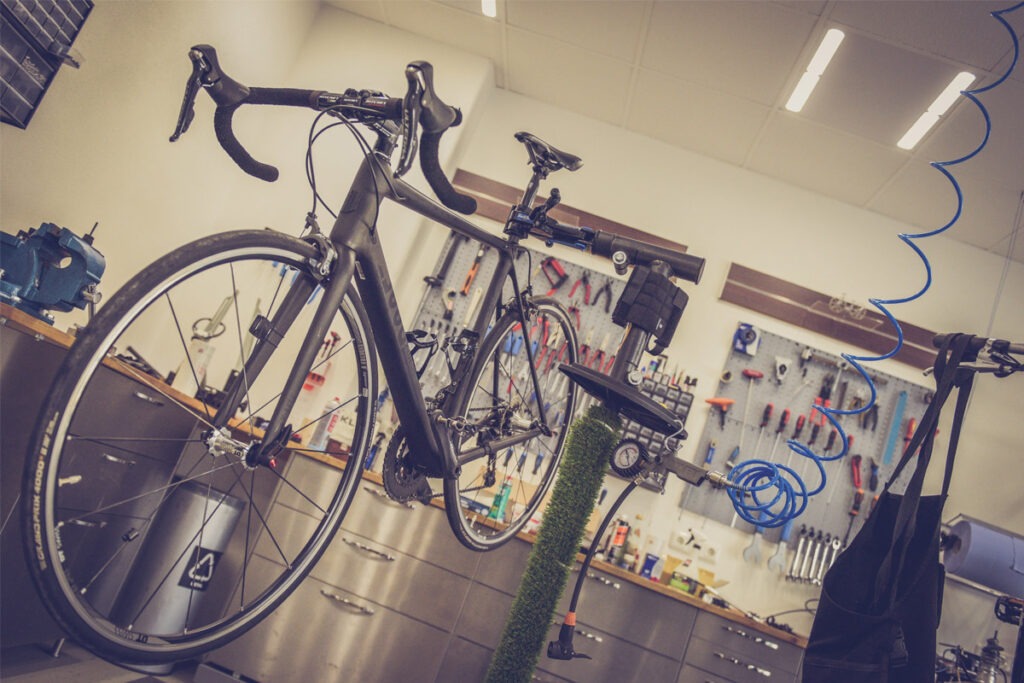
Sydney, NSW
Year after year, independent bicycle dealers (IBD’s) miss out on sales of entry level bikes because the customer thinks it’s cheaper to buy a bike from K-Mart or another mass merchant.
All of us in the bike industry know that most mass merchant bikes are rubbish! But it’s hard to get a sale over the line if your base model bike is two or three times dearer to purchase.
Thanks to a new report by Australia’s most trusted consumer organisation, dealers now have some independent evidence that they can share with future potential customers.
Sixty five years ago the Australian Consumers’ Association (ACA) was founded as a not for profit consumer advocacy organisation. Shortly afterwards they founded Choice magazine which soon gained a huge subscription base and continues to this day. According to Wikipedia, the ACA had over 80 staff as of 2019.
Choice does not accept any advertising from any of the companies whose products it tests, so that it can be free from commercial influence. It also anonymously purchases the products it tests, paying the market price. Over the past six decades it has built a highly respected reputation for conducting thorough and objective comparative evaluations of consumer products.
Occasionally over past years, bicycles have come under their microscope. Recently, Choice partnered with another Sydney based social enterprise, Revolve Recycling, to conduct a long term comparison between two K-Mart bikes and two IBD (independent bicycle dealer) bikes.
The information below is taken from the summary article, already published by Choice. We’d also like to thank Guido Verbist, General Manager of Revolve Recycling for alerting us to this study and sourcing both the text and photos. You can read the full Choice evaluation here. The more detailed information at the bottom of the following article, regarding the specific bike assessments including dollar value of repairs, came from a media release published by Revolve Recycling.
Four Bikes, Thousands of Kilometres of Testing & Evalutation
Choice purchased these four bikes:
- K-mart Esplanade Cruiser ($187)
- K-mart Copenhagen ($197)
- Merida Speeder 10 ($535)
- Norco Yorkville 2018 ($543)
Four cyclists each rode one bike for around for six months, using it for commuting and casual recreation. Time on the bikes ranged from 40 hours to over 70 hours, and distance travelled ranged from 600km to over 1,400km.
Trained mechanics at Revolve Recycling checked every bike at monthly intervals and serviced the bikes as required, noting the cost involved.
K-mart Bikes Get Off to a Bad Start
The models from a bike store were put together mostly satisfactorily, but the K-mart bikes were not. The Revolve Recycling mechanic had to make a lot of corrections to the K-mart bicycles before giving them to the trial riders.
The Bottom Line
Both of the bike store bicycles had issues that were dealt with by servicing regularly (once every six months), including wear and tear you’d expect with the amount of riding that was done.
By the end of the test, the two bike shop samples were in good condition overall and fit for continued commuting, with some notes on replacement recommendations in the coming months.
“The second K-mart sample, the Esplanade, had started to rust from the first couple weeks of use.”
The K-mart Copenhagen had a front brake that completely failed and needed to be replaced. In the second assessment, the rear brake was noted as about to fail so also had to be replaced.
The chain was of poor quality and was wearing out faster than the other bikes. The tyres were also of poor quality and the rear one had to be replaced as it started to crack. The brake pads were very soft as well, which meant they wore down quickly.
Overall, there were $140 of replacement part costs during the six-month test period. The rider also noticed they were getting “ghost” shifting, which means the gears would change for no apparent reason.
The second K-mart sample, the Esplanade, had started to rust from the first couple weeks of use. Each time it came in for service, the bottom bracket had come loose, which would make the chain come off. The rust on the brake cables made them difficult to operate properly.
Aside from not being able to replace the derailleur hanger, the front wheel developed a wobble that was causing the wheel to rub on the brake pads.
Detailed Assessments of Each Bike
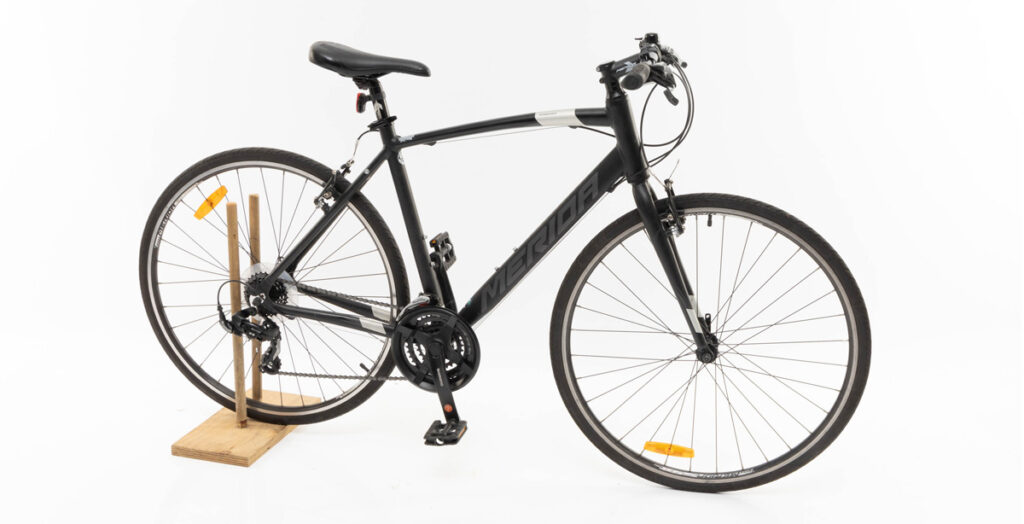
Bike 1: Merida Speeder (Bike Shop Bike)
The Merida Speeder bike is the most affordable option in the Merida hybrid range. It has a 3×7 Shimano Tourney drivetrain and V-brakes.
- Total distance covered during test period: 661.46kms
- Total riding time during the test: 43.7 hours
- Purchase price: $535
- Service and/or repair cost: $150 for a standard maintenance service with no repairs required
Mechanic’s Overview at Start
‘On purchase, the bike’s construction and set-up were mostly adequate and correct.’
‘Minor adjustments were made to the grips and brake lever position to improve the ergonomic fit. Minor adjustments were made to loosen the wheel bearings to ensure proper longevity.
Both wheels were ever so slightly out of true by 1-2mm. The gears required a very slight adjustment to ensure they changed under load. This was likely due to a small amount of cable stretch which is normal when a bike is new. This would have been rectified at the first free tune-up which is offered by 99 Bikes six weeks after the purchase of the bike. Otherwise, the bike was in good working order. The brakes were set up correctly and were stopping well.’
Mechanic’s Overview at Finish
‘Throughout the test period, the bike performed adequately. The bike displays normal wear and tear for six months of daily usage.’
‘The brake pads and chain are starting to show wear that is consistent with daily use. The components still have a fair bit of life left in them; I would recommend replacing the brake pads and chain after another three months of daily use. The bearings in the rear wheel and the headset bearings had developed a minor amount of play. This was corrected during one of the monthly service checks. All cables are still in good condition and are moving freely.’
‘The bike is in good overall condition and fit for continued usage and commuting.’
Selected Comments from Bike 1 Test Rider
- ‘Bike felt good’
- ‘Super enjoyable ride’
- ‘Noisy in wet conditions but ultimately effective brakes
- ‘Bike felt stable’
- ‘Picked up bike from mechanical check. Ride felt great. Brakes were firm. Gear changes smoothly. Good ride.’
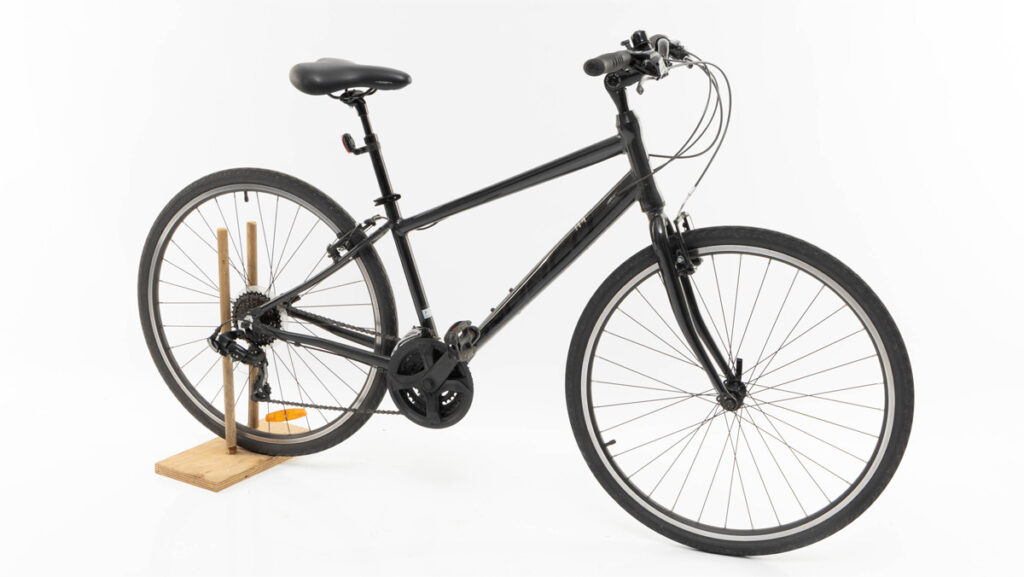
Bike 2: Norco Yorkville (Bike Shop Bike)
The Norco Yorkville bike is the most affordable option in the Norco hybrid range. It has a 3×7 Shimano Tourney drivetrain and V-brakes. There are a couple of component choices on this bike that are somewhat outside the norm. It has an old-style threaded headset instead of the modern “threadless” standard. It also uses a free-wheel cluster instead of a cassette on the rear wheel. While these are older standards, they are adequate for this type of bike. The bike has internal cable routing and continuous housing which is a good option for weatherproofing the gear and brake cables.
- Total distance covered during test period: 1417.82kms
- Total riding time during test period: 69.7hrs
- Purchase price: $543
- Service and/or repair cost: $150 for a standard maintenance service with no repairs required
Mechanic’s Overview at Start
‘The bike’s construction and set-up was mostly good.’
‘The wheel and headset bearings were correctly adjusted. All derailleur adjustments were correct and the gears were changing well. The only adjustment that was made was the position of the brake pads. They were positioned slightly below the braking surface on the wheel. While they stopped the bike adequately, the position of the pads would have led to an uneven wear pattern on the brake pads. The pads were positioned correctly before handing the bike over to the test rider.’
Mechanic’s Overview at Finish
‘Throughout the test period, the bike performed well. Out of the four test bikes, the Norco bike got the most amount of use by its test rider.’
‘The bike displays normal wear and tear for six months of daily commuting. The brake pads and chain are starting to show wear that is consistent with daily use. All cables are still in excellent condition due to the full cable housing. The test rider commented that it made a slight clicking noise when riding in the higher gears. I was unable to reproduce this noise when testing the bike. It changed gears well when the bike was brought in for its monthly check-up.’
‘The bike is in good overall condition and fit for continued usage and commuting.’
Selected Comments from Bike 2 Test Rider:
- ‘Good, fast ride home.’
- ‘Nice smooth ride. Still some chain noise in the high gears.’
- ‘Felt nice and fast. Still a slightly knocking sound in gears 5 and 7 but a lot better..’
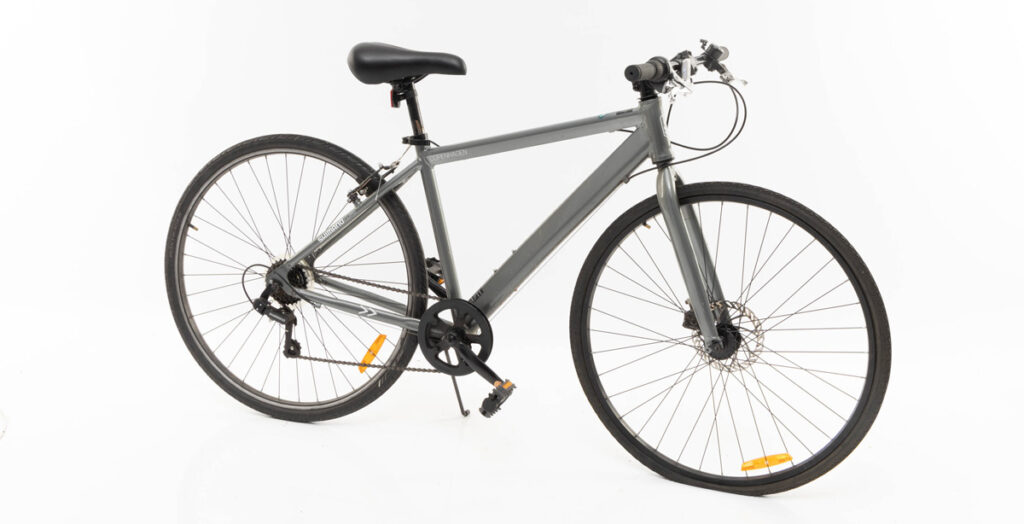
Bike 3: Copenhagen (K-mart Bike)
The Copenhagen is a stylish-looking urban bike from K-mart. It has a 6-speed drivetrain with a basic Shimano derailleur. Idiosyncratically, it is supplied with a disc brake on the front and a V-brake on the rear. The frame is aluminium, and the forks are steel. The components are of observable low quality, such as flimsy plastic brake levers, heavy steel cranks, solid axles (no quick-release levers), and steel handlebars, stem and seat post.
- Total distance covered during test period: 1156.47kms
- Total riding time during test period: 74.5hrs
- Purchase price: $189 + $8 assembling fee = $197
- Service and/or repair cost: $450 for three repair services + $140 for replacement parts = $590
Mechanic’s Overview at Start
‘The bike is normally sold in a box with “some assembly required”. We opted to have the bike assembled by K-mart’s bike assembler. There were numerous issues with the bike before it had been wheeled out of the workshop.’
‘The headset bearings were too tight. This would have led to premature wear in the headset. The derailleur was inadequately adjusted. The limit adjustment screws and the cable tension were incorrectly set. Both hub bearings required adjustment. The seat post required grease to prevent seizing. Both brakes were poorly adjusted and required tightening.’
Mechanic’s Overview at Finish
‘This bike was riddled with problems throughout the test period.’
‘The most concerning issue of all was that the front brake completely failed! The brake calliper broke and wasn’t stopping the bike at all. As this is a major safety concern, we replaced the front brake calliper with a good-quality Shimano brake calliper and a quality Tektro lever.
‘When the bike came in for its second monthly assessment, we noticed that the rear brake lever was about to fail. It had lost the nut on the back of the lever and it was about to come apart. The lever was replaced with another decent Tektro lever.’
‘The chain is poor quality and showed a faster rate of wear than the Norco and Merida
bikes.’
‘The tyres are also poor quality and the rear tyre required replacing as it had started to crack. This is potentially very dangerous as it could lead to a catastrophic blowout. ‘The brake pads wore out at a very accelerated rate. The pad compound is very soft and didn’t prove to be durable.
‘The cost of all the replacement parts is as follows:
Brake calliper – $40
Brake levers – $30
Brake pads – $20
Rear tyre – $50
TOTAL: $140
‘Throughout the test period, the test rider complained of constant “ghost shifting” in the lower gears. The bike would suddenly change gears for no apparent reason, usually at the most inopportune moment – when pedalling hard up a hill.
‘Each time the bike came back for a check-up, the derailleur cables would be readjusted. By the time it returned for the next check-up, the derailleur cable would lose its tension and require readjustment.’
Selected Comments from Bike 3 Test Rider:
- ‘Still figuring out gear alignment. Have to jiggle the lever to stop the gears making a ticking sound.
- ‘Chain jumped off again.’
- ‘Gears are jumping.’
- ‘Some ghost gear changes when riding up a hill. I only want to be in 1st but it’ll randomly decide 2nd is preferred even though I’m about to keel over. I was hoping the bike would feel lighter by now.’
- ‘My back wheel is so wonky now.’
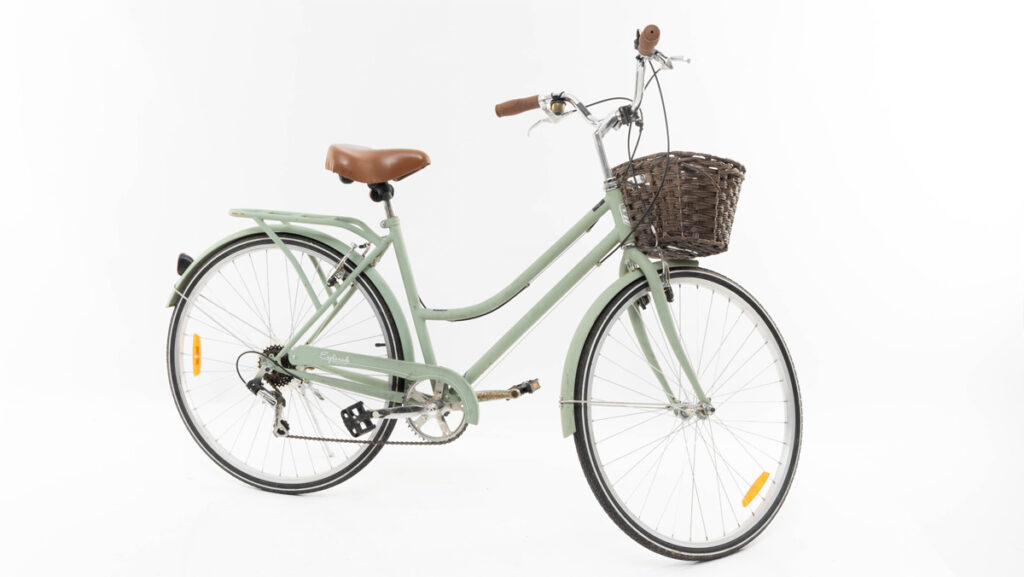
Bike 4: Esplanade (K-mart Bike)
The Esplanade is a classic-looking, step-through bicycle inspired by the sort of bicycle you would expect to ride in the Dutch countryside. It is a very heavy bike as it is almost entirely made of low-quality steel. On the front is a fake wicker basket which makes it useful for small shopping trips. It has a 6-speed drivetrain with a basic Shimano derailleur. It is also supplied with a rack on the back, a kickstand, mudguards on both wheels and an oversized saddle.
- Total distance covered during test period: 730.62kms
- Total riding time during test period: 56.3hrs
- Purchase price: $179 + $8 assembly fee= $187
- Service and/or repair cost: $450 for three repair services
Mechanic’s Overview at Start
‘This bicycle was assembled by the K-mart bike assembler. There were numerous assembly errors. Bearings were either way too tight or way too loose. The headset was so tight that it didn’t freely spin. The rear hub bearing was so loose that it could be unscrewed by hand. The derailleur was so poorly adjusted that it hardly moved at all. There was almost no tension in the derailleur cable. There was no grease in the seatpost or the steering column. The brakes were extremely difficult to pull.’
Mechanic’s Overview at Finish
‘The Esplanade suffered from several significant issues throughout the test period.’
‘The bottom bracket had come loose every time it was in for a check-up. This was causing the cranks to wobble and would occasionally result in a dropped chain.’
‘The most disappointing problem with this bike is the poor quality of the materials. The entire bike is rusting within the test’s six-month duration. There is rust appearing on the frame, the handlebars, both wheel hubs, the spoke nipples, the cranks, and the brake callipers.’
‘The brake cables also suffered from rust which impeded the brakes from working properly. The test rider complained that the derailleur wasn’t changing gears properly. The derailleur cable had lost tension and was very finicky to adjust. I suspect that the derailleur hanger is slightly bent; however, it is not possible to repair as it is riveted directly onto the derailleur. This is unlike most bikes where the derailleur can be unscrewed from the hanger to allow for hanger adjustments.’
‘The front wheel had also developed a wobble that was causing the wheel to rub on the brake pads.’
Selected Comments from Bike 4 Test Rider:
- ‘Gears are very clunky. Heavy bike. Will take some time to get used to.’
- ‘Small inclines are harder on this bike.’
- ‘Fourth gear has some rattling sounds.’
- ‘Bolts are rusty from the rain.’
- ‘Bike is taking a long time to engage the gears – it takes about 7 rotations to engage, not quick enough when going up hills.’
- ‘I think if I hadn’t been getting the bike serviced regularly, I wouldn’t be able to ride it at this point. But how realistic is it to get a bike service every month?’
- ‘I’m not enjoying riding this bike – I am ready to end the experiment. It is not safe; it’s not a good bike for consistent use. If I hadn’t been getting monthly mechanic fixes, I wouldn’t be able to ride this for so long.’
NB: It was not easy to keep Bike 4 Test Rider continuing with the test due to their understandable concern with the multiple operational and safety issues of the test bike.
Overall Cost of Ownership for Six Months
When the true cost of the bikes is considered, they were as follows during the test:
| Bike | Retail Price | Overall Cost, including assembly, services and replacement parts |
| Merida | $535 | $685 (1 standard service; no repairs or parts) |
| Norco | $543 | $693 (1 standard service; no repairs or parts) |
| K-mart Copenhagen | $189 | $787 (3 repair services and parts) |
| K-mart Esplanade | $179 | $637 (3 repair services) |
The K-mart bikes – though ‘cheaper’ at the point of initial purchase – have true costs over even six months of their life-cycle that are comparable or even higher than the most affordable hybrid bikes of two major bike brands.
If the same trajectory continued over 12 months or more, the K-Mart bikes would both have a substantially higher total cost of ownership than the bike shop bikes.
Additionally, there are ‘hidden’ costs that are not represented but should be considered, by bike consumers including:
- Lost opportunities and inconvenience to riders/consumers from having to take flat-box bikes in for additional services and repairs;
- Negative cycling experience for new riders who are exploring the micro-mobility space
- Safety risks resulting from operational failures by flat-box bikes.
- Environmental impact of flat-box bikes essentially being ‘waste on wheels’.
In the last regard, it is highly doubtful that (outside a test context) most riders/consumers would persist with nearly bi-monthly repairs that end up exceeding the initial retail price of their bikes. It would make no financial or practical sense to keep trying to fix something that’s of such poor quality to begin with.
A slightly different version of this article was first published in our sister newsletter, the Micromobility Report.
Join the Conversation
What is your opinion on the quality of mass merchant bikes? Do you service them in your workshop? Do you think they help or harm the overall bike industry?

We all know that generally, most if not all mass merchant bikes are rubbish. We have eventually arrived at the point where we try to dissuade customers from spending money on them for servicing or repairs. In fact we try to save customers from themselves by adamantly refusing to work on anything, mass merchant or otherwise, which is beyond its useful life or not economically viable. This can occasionally create an unhappy customer, but we prefer them to be unhappy with us not having done anything, rather than unhappy with the result of any repairs undertaken which almost invariably fall short of their unrealistic expectations of what is possible with these poor quality bikes.